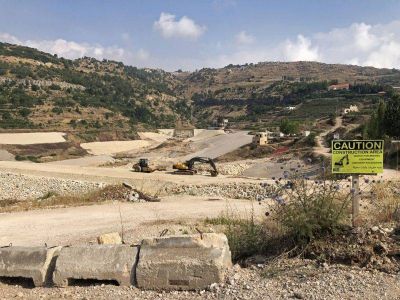
A powerplant in Lebanon. (Philippe Hage Boutros/L'Orient-Le Jour)
BEIRUT — It’s a familiar story: a law gets passed or a decree issued and nothing much changes. Legally, generator owners must provide electricity meters at their own expense and drivers can’t use their cellphones behind the wheel, but Lebanon’s institutions do very little to ensure those laws are followed.
A sweeping 2021 law to reform the system for public purchases and contracts could meet the same fate, given the powerful players with a possible interest in blocking its implementation. But advocates for financial reform say they are set on making sure that doesn't happen.
The law, which took effect July 29, 2022 and has already been partially implemented, aims to standardize the procedures that all public institutions — from ministries to municipalities to state-owned companies — must use when purchasing goods and services.
“It is a whole new system for doing procurement in the Lebanese state … and all entities that disburse public money, the people’s money,” said Lamia Moubayed, president of the Institut des Finances Basil Fuleihan, an autonomous capacity-building unit at the Ministry of Finance that was set up in cooperation with the French government in 1996.
These public procurement contracts account for an average 20 percent of the central government’s spending. Many of Lebanon’s highest-profile corruption scandals originate from deals involving politically-connected companies winning contracts to provide services that range from waste management to road construction to power generation.
In Lebanon, “when you say ‘procurement’, you say ‘corruption.’ They go hand in hand,” Moubayed said.
“The single most important principle of the law is that it applies to everybody,” she added.
The push to fully implement the law “has created a momentum,” said Assaad Thebian, head of government transparency watchdog Gherbal Initiative, but it has not yet been very effective.
“Only 11 bids have been awarded within a month and a half,” he said. “When we monitored the bids published in the national gazette last year, they reached over 1,000 in one year; so the numbers are very low.”
Gherbal launched a separate website to track procurement contracts. The majority of contracts offered since the procurement law went into effect have not followed the procedures outlined in the new law, Thebian said.
For his part, Jean Ellieh, president of the new Public Procurement Authority (PPA) and former director general of its predecessor, the Central Tender Board (CTB), called the administrations’ response to the new system “more than good.”
Considering the economic crisis in the country, he said the low number of bids entered into the platform is not indicative of a lack of compliance but rather a lack of government procurement.
“You can’t take the number of bids because, today, there are no bids,” Ellieh said. “We are in a very exceptional situation. There are no tenders, no one is offering tenders. And even when there are tenders, people aren’t coming to bid for them because of the unstable price of the dollar and other considerations.”
But he added, “In terms of the administrations and procurement parties, I am indeed satisfied with the situation,” touting the fact that the country’s two major mobile communications companies both entered the system.
Political pushback
As the 2021 procurement law approached the date it would take effect, political actors realized, to their surprise, it was actually being implemented, Moubayed said, and rushed to push for exceptions.
Banque du Liban Governor Riad Salameh sent a letter to Prime Minister Najib Mikati on July 5 stating his refusal for BDL to be subjected to the new rules on transparency and oversight. He claimed the procurement law contradicts the Code of Money and Credit, and that it would harm “the privacy and independence” of the bank.
Ellieh responded that the procurement law passed by Parliament cancels any legal text that contradicts its provisions, and denied that it would harm the independence of the bank. On Aug. 11, the PPA formally requested BDL to deposit procurement documents in compliance with the law.
Representatives for BDL and the PPA told L’Orient Today the required documents have been submitted.
At the beginning of August, the Progressive Socialist Party’s parliamentary bloc introduced a proposed law into Parliament to delay the application of the law to municipalities.
“I introduced a draft law to delay implementation of the public procurement law only for municipalities to give them time to prepare themselves for this law,” MP Bilal Abdallah (Chouf/PSP) told L’Orient Today, adding that “there are specific difficulties for small municipalities to carry out their mission” in accordance with the law.
The draft law is still being studied in committee, Abdallah said. Parliament is “trying to make a few amendments to the public procurement law until they sort out the issues of municipalities.”
Other municipalities also held meetings and refused to apply the law, according to Thebian.
“The resistance is very high,” he said.
What will the new system look like in practice?
The 2021 procurement law created a new regulatory authority — the PPA — to monitor contracting across the public sector and centralize tenders via a unified electronic platform, while leaving the actual dealmaking to the over 1,000 local and central state institutions. An electronic portal is online but it is not the final platform, according to Ali Taha, a researcher at the Lebanese Center for Policy Studies.
“The success of the e-procurement platform is key and is actually a measure of the success of the reform as a whole because it’s the only way we can actually guarantee transparency and standardization,” said Taha.
The law also abolished the opaque classification system that determined which companies would be allowed to bid for contracts behind closed doors. Researchers at The Policy Initiative who studied the Council for Development and Reconstruction found this system gave leeway for politically-connected design consultants to create biased conditions favoring certain companies.
The new law standardizes the pre-qualification procedures and also imposes standards for selecting civil servants to serve on the bidding and acceptance committees, to make it harder to stack such committees with cronies.
If companies competing for a bid believe the criteria used for a contract to be biased, they can appeal to the new PPA, which has the authority to stop the tendering until the issue is resolved.
What are the remaining hurdles to implementation?
Fully implementing the law would mean training thousands of civil servants across Lebanon in new technology and procedures, a major feat even without the economic crisis that is devastating the civil service.
This may present particular issues for local governments with limited resources. However, Moubayed pointed out that the procurement contracts of small municipalities will generally be small enough that they won’t be burdened with the full set of procedures as applied to big contracts. They can also get bureaucratic help from outside the municipality.
For projects worth less than LL1 billion, there are simplified procedures for procurement under the new law. Eliah also noted that several memorandums have been issued to facilitate the implementation of the law by municipalities.
Taha added that trainings have already been conducted for “a few hundred municipalities” to teach civil servants in the new procurement system and digital platform, and that these trainings will continue.
“[The Institut des Finances] do realize there’s a lack in terms of the technical capacities of the staff of most municipalities,” Taha said.
Gherbal Initiative also launched trainings and workshops in each governorate to target both citizens and public administration employees.
Taha is also researching strategies to motivate municipalities to implement the new processes, especially to overcome civil servants’ reluctance to learn new tools outside their prior job descriptions. This could include highlighting benefits to hard-up civil servants, like the ability to use digital tools from home and thus avoid transportation costs.
One high-level concern, Moubayed said, is that exceptions will be carved out.
The PPA’s predecessor, the CTB, was routinely bypassed by public institutions, municipalities, and autonomous agencies, which were allowed to avoid oversight by creating their own procurement bylaws that excluded the CTB. In some cases, even when the CTB was involved in a tender, their feedback, which was non binding, was ignored or flatly contradicted by fiat of the cabinet.
In 2019 only five percent of tenders fell under the CTB’s supervision, according to the annual report from that year.
“If we do make exceptions, and if by any chance it happens that a law is voted to exempt institutions from implementing the law, this whole reform and this whole effort is going to crumble and Lebanon again will prove that it is unable to stand by its commitments,” Moubayed said.
“This is a cry for every single parliamentarian who has a little bit of conscience to think and get himself informed of the risks that backing off this law is going to be for Lebanon.”
UPDATE: A sentence about the upcoming electronic platform has been edited for clarity.

